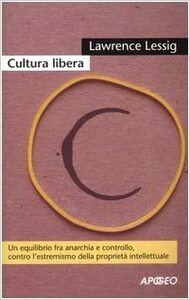Take a photo of a barcode or cover
reflective
slow-paced
When I read this years ago, it forever changed my perspective of intellectual property. I truly wish Professor Lessig would consider an update.
challenging
informative
sad
slow-paced
This is a deeply thought provoking writing about free culture and the related state of law. It contains many interesting stories about similar situations from the past. The writer shows vividly how can hold the current laws back the progression of the technology and the possibilities which it provides to the artists. Moreover Lessig outlines a complex possible solution to resolve the current issues.
Fantastic look at the evolution of copyright in America over the last century and how technology (especially the Internet) is affecting it. Despite being eight years old, it is still relevant w/r/t the Internet, though I would be curious to see more updated numbers on estimated file-sharing and discussion of more recent issues such as Netflix/Hulu vs. the cable distributors. This book discusses how radically the conversation about media rights and the assumptions we previously held have shifted in recent years as the MPAA and RIAA have lobbied to keep the public domain from growing. Worth reading if you care about the rights of artists and creators, trends in legislating digital media, or just understanding why YouTube videos keep getting taken down for the most absurd reasons, this book is for you.
A bit preaching to the choir, but not lessig's fault... A must read for anyone wanting to have an argument in favour of 'information wants to be free'.
I don't know how to fairly rate this book. Lessig's writing is clear and cogent. Within the property system as it stands, he lays out a compelling argument for placing limits on copyright. However, Lessig continually writes himself into ideological knots to avoid challenging the concept of private property itself, which leaves this book a frustrating tangle of half-measures. Lessig perpetually declares he is not an anarchist and consistently uses that term derisively, yet his own arguments underscore the oppressive nature of our current system. Lessig seems terrified of an increasingly obvious truth: Private property is inherently oppressive, doubly so when it's applied to the realm of ideas.
I'm glad I read this book and will gladly recommend it to anyone interested in the conservative argument for limiting copyright, however it's only reaffirmed my own commitment to anarchism. Lessig's only goal is to mitigate the ills of capitalism's property system, rather than take the canker by the roots and remove it. As such, his arguments never rise to meet the moment, and instead flounder in the philosophical shallow end. He's clearly possessed of a brilliant mind, but he misdirects his talents by trying to constrain a monster that ought to be slain.
I'm glad I read this book and will gladly recommend it to anyone interested in the conservative argument for limiting copyright, however it's only reaffirmed my own commitment to anarchism. Lessig's only goal is to mitigate the ills of capitalism's property system, rather than take the canker by the roots and remove it. As such, his arguments never rise to meet the moment, and instead flounder in the philosophical shallow end. He's clearly possessed of a brilliant mind, but he misdirects his talents by trying to constrain a monster that ought to be slain.
informative
medium-paced
Most of us assume that copyright law exists, first and foremost, to protect the intellectual property of creators. Free Culture, however, asks us to reconsider this assumption. Whose interests does copyright law serve, how has this changed throughout history and what implications does this have for our creative culture? These are the fundamental questions that this book takes up.
Free Culture contextualises the contemporary debates about p2p file-sharing by tracing the inconsistent history of copyright law. Using some fascinating (and very clever) examples, Lessig reveals the way in which many of our current media industries were established through what we would now call "piracy". He draws our attention not only to a history of "borrowing", but also to a legal tradition that endorsed it because of the cultural benefits.
Why, then, are today's technological innovators the target of such harsh infringement penalties? Lessig eloquently argues that copyright law protects our existing media industries from potential competitors. Ultimately, copyright has come to serve the interests of powerful industries at the expense of our creative culture. This stifling of creativity, as a result of vested interests, is Lessig's fundamental concern- and it should be ours.
Free Culture is not anti-copyright, nor does it advocate a "no rights reserved" culture. It does, however, make a compelling case for reform that cuts unnecessarily long and restrictive copyright terms. Lessig ultimately proposes a balance that recognises the rights of yesterday's creators without restricting the creative freedom of today's innovators.
This book was thoroughly engaging and incredibly informative. But most significantly, it encouraged me to re-evaluate assumptions about intellectual property that I had taken for granted and accepted as fact.
Free Culture contextualises the contemporary debates about p2p file-sharing by tracing the inconsistent history of copyright law. Using some fascinating (and very clever) examples, Lessig reveals the way in which many of our current media industries were established through what we would now call "piracy". He draws our attention not only to a history of "borrowing", but also to a legal tradition that endorsed it because of the cultural benefits.
Why, then, are today's technological innovators the target of such harsh infringement penalties? Lessig eloquently argues that copyright law protects our existing media industries from potential competitors. Ultimately, copyright has come to serve the interests of powerful industries at the expense of our creative culture. This stifling of creativity, as a result of vested interests, is Lessig's fundamental concern- and it should be ours.
Free Culture is not anti-copyright, nor does it advocate a "no rights reserved" culture. It does, however, make a compelling case for reform that cuts unnecessarily long and restrictive copyright terms. Lessig ultimately proposes a balance that recognises the rights of yesterday's creators without restricting the creative freedom of today's innovators.
This book was thoroughly engaging and incredibly informative. But most significantly, it encouraged me to re-evaluate assumptions about intellectual property that I had taken for granted and accepted as fact.






